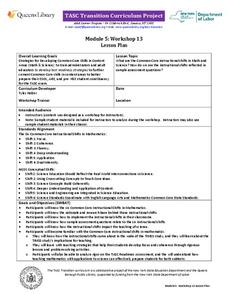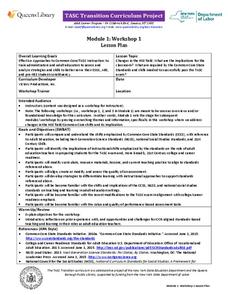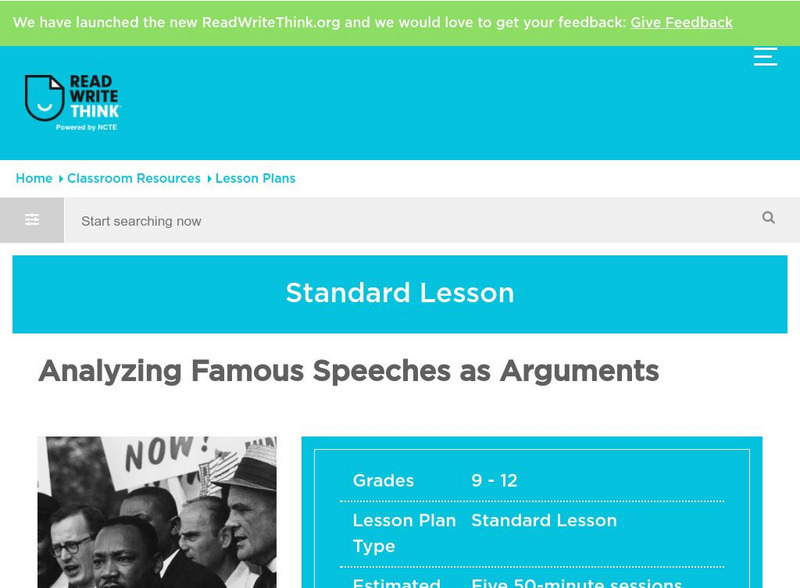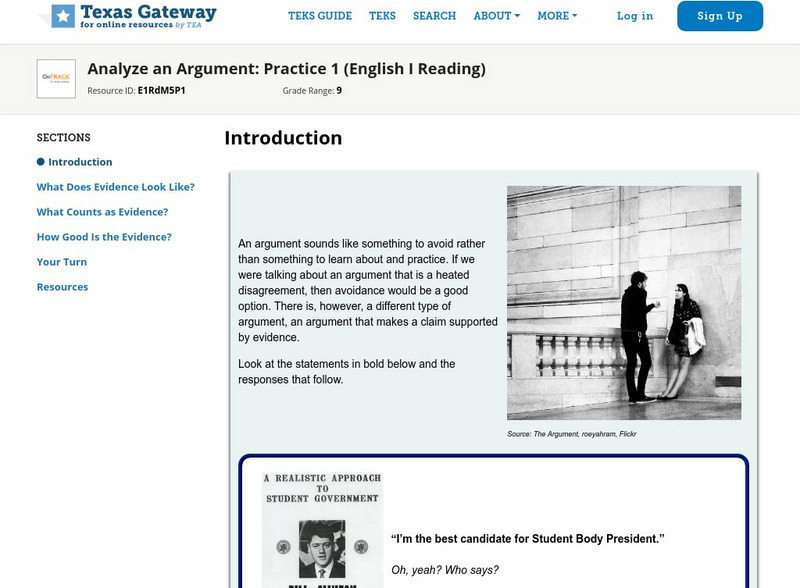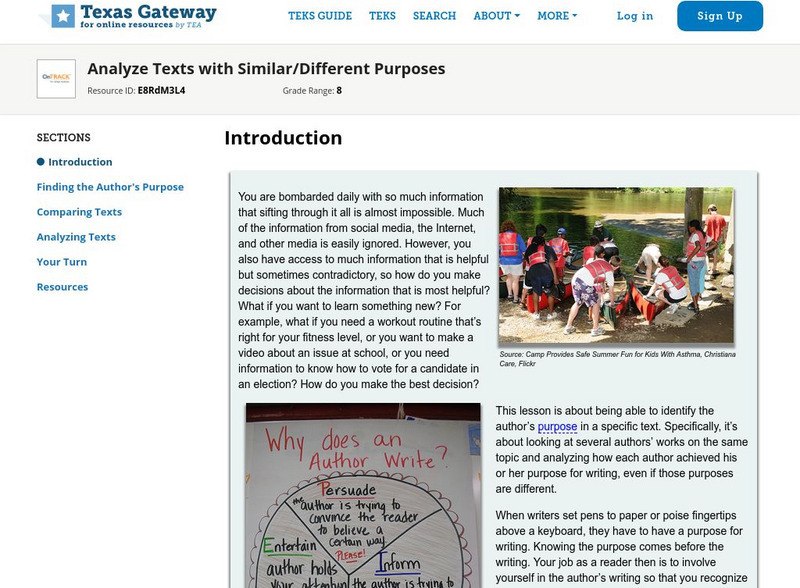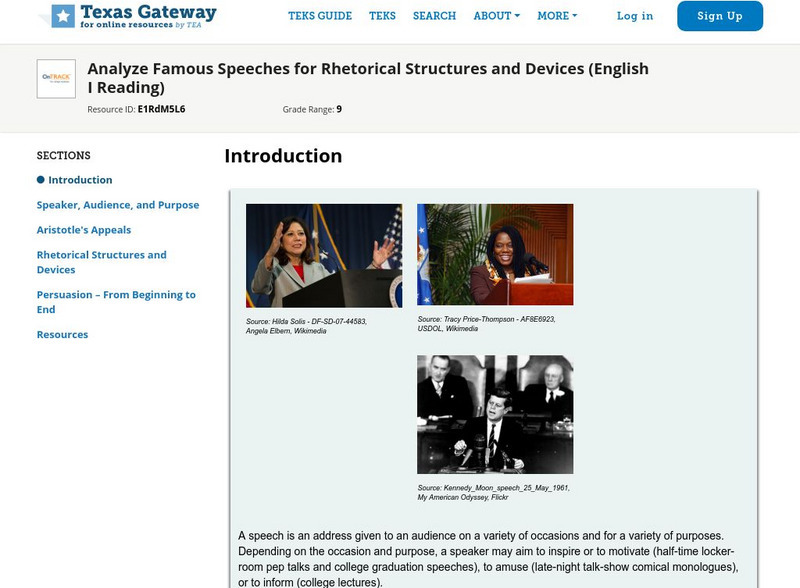College Board
AP® Psychology Cognition and Language
I can remember what happened five years ago, but I can't recall what I did last week! High school psychology students analyze how memory, cognition, and language impact one another. Hands-on activities, memory exercises, and research...
Missouri Department of Elementary
R-E-S-P-E-C-T: A Basic Skill
Imagine seventh graders developing a school wide plan to promote respect in their school. That's the vision behind the second lesson in the R-E-S-P-E-C-T series. In preparation for designing a school-wide media campaign, class members...
American Psychological Association
Developing Adolescents
Why to young people act the way they do? Scholars investigate the stages of adolescent development incorporating high school psychology techniques. Using research from the American Psychological Association, they uncover the five areas...
New York State Education Department
TASC Transition Curriculum: Workshop 11
You'll C-E-R a difference in classroom achievement after using a helpful lesson plan. Designed for economics, civics, government, and US history classes, participants practice using the CER model to craft arguments about primary and...
New York State Education Department
TASC Transition Curriculum: Workshop 13
The six instructional shifts in this workshop definitely move math and science teachers' understanding of instruction. The workshop, 13th out of a series of 15, asks participants to examine sample tests and to look at how the six...
EngageNY
TASC Transition Curriculum: Workshop 15
What do a cheetah, Audi commercial, and air have in common? They're all topics of an engaging inquiry-based, hands-on workshop for educators about background knowledge, reading strategies, the CER model, and argumentative writing. The...
New York State Education Department
TASC Transition Curriculum: Workshop 10
How have educational standards evolved? Educators of adults examine expectations in the 10th workshop out of 15 to better determine how standards have grown. Participants respond to a variety of sample questions to determine how they...
New York State Education Department
TASC Transition Curriculum: Workshop 2
Flipped classrooms and online tools killed the chalkboard! An awesome, hands-on technology workshop asks teachers across all content areas. to examine model lessons, become familiar with research, and explore tech tools they can...
New York State Education Department
TASC Transition Curriculum: Workshop 1
Work out your core, Common Core State Standards, through the first workshop in a series of 15 designed for educators. Inquiry-based activities designed for all content areas and grade levels explore the shifts to new standards,...
New York State Education Department
TASC Transition Curriculum: Workshop 3
Teachers turning into learners? It's not Freaky Friday! It's a thoughtful workshop that teaches participants how to plan professional development for staff. Third in a 15-part series, the workshop provides a platform for the other...
New York State Education Department
TASC Transition Curriculum: Workshop 7
Designed specifically for math instructors, the seventh workshop of a 15-part series allows time to explore Webb's DOK, ponder open-ended questions, and create lessons to apply what is learned. Teachers craft high-quality math problems...
EngageNY
TASC Transition Curriculum: Workshop 8
Lights, camera, action! Math educators consider how to improve their instruction by examining a model of the five-practice problem-solving model involving a movie theater. Participants examine cognitive demand in relation to problem...
ReadWriteThink
Read Write Think: Analyzing Famous Speeches as Arguments
This multi-session lesson features the opportunity to analyze a variety of famous speeches. Students will look carefully at tone, rhetoric, propaganda techniques, and historical context as they write an analysis paper....
Texas Education Agency
Texas Gateway: Analyze Thesis, Purpose, Textual Elements in Informational Text
[Accessible by TX Educators. Free Registration/Login Required] This lesson focuses on how to locate the controlling idea or thesis and specific purpose in a text and analyze the roles they play in understanding what you read. You will...
Texas Education Agency
Texas Gateway: Analyze an Argument: Practice 1 (English I Reading)
In this lesson, students practice analyzing the evidence that supports or opposes an argument. They are also going to learn to analyze the quality, relevance, and credibility of the evidence so you can decide whether to accept the...
Texas Education Agency
Texas Gateway: Analyze Clarity of Objectives of a Procedural Text
[Accessible by TX Educators. Free Registration/Login Required] In this lesson, students will learn how to analyze writing in software, warranty, and consumer manuals or publications.
Texas Education Agency
Texas Gateway: Analyze Texts With Similar/different Purposes
[Accessible by TX Educators. Free Registration/Login Required] This lesson is about being able to identify the author's purpose in a specific text. Specifically, it's about looking at several authors' works on the same topic and...
Texas Education Agency
Texas Gateway: Analyze Texts With Similar/different Author's Purpose
[Accessible by TX Educators. Free Registration/Login Required] This lesson focuses on being able to identify the author's purpose in a specific text. Specifically, it's about looking at several authors' works on the same topic and...
Texas Education Agency
Texas Gateway: Analyze Graphical Sources: Practice 2 (English Ii Reading)
[Accessible by TX Educators. Free Registration/Login Required] In this lesson, students will learn how to evaluate the clarity and visual appeal of images and other graphic elements included in a reading text. RL.9-10.7 analyze 2 media
Texas Education Agency
Texas Gateway: How to Read and Analyze an Essay (English Iii Reading)
[Accessible by TX Educators. Free Registration/Login Required] In this lesson's activities, you will determine the purpose of description, narration, and exposition essays, analyze their literary devices, and examine text features. You...
Annenberg Foundation
Annenberg Learner: Analyzing Complex Text
During this lesson, students will use close reading strategies to analyze aspects of the setting in The Adventures of Huckleberry Finn by Mark Twain. [7:57] CCSS.ELA-Literacy.CCRA.R.10, RL.11-12.10a/b Text Complexity
Texas Education Agency
Texas Gateway: Analyze Famous Speeches for Rhetorical Structures and Devices
In this lesson, you will learn to analyze persuasive speeches and examine the impact of rhetorical structure and the use of devices in famous speeches. It includes activities such as matching quotes from famous speeches to the speakers...
Texas Education Agency
Texas Gateway: Analyze Linear Plot Developments in Literary Texts/fiction
[Accessible by TX Educators. Free Registration/Login Required] This lesson focuses on how conflicts determine the resolution of the story. In this lesson, students learn how to recognize conflict, analyze linear plot, and determine how...
Texas Education Agency
Texas Gateway: Analyze the Central Characters in Literary Text/fiction
In this lesson, students will learn some ways that writers reveal the complexity of their characters. By closely analyzing one author's characters, they will come to see how their words, actions, and interactions with one another can...
Other popular searches
- Analyze Portraits
- Analyze Characterization
- Analyze Maps and Charts
- Analyze Setting
- Analyze Writing Technique
- Analyze Character
- Analyze Poetry
- Analyze Letter to Editor
- Analyze Information
- Analyze Facts
- Analyze Author's Use of Text
- Analyze Plot Development




